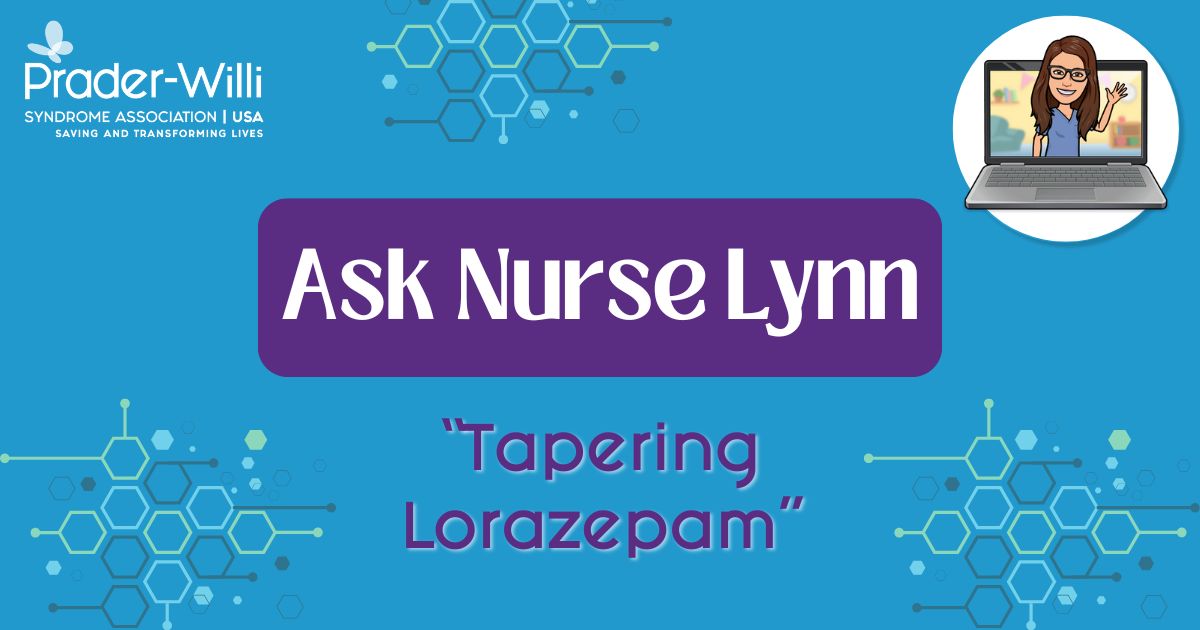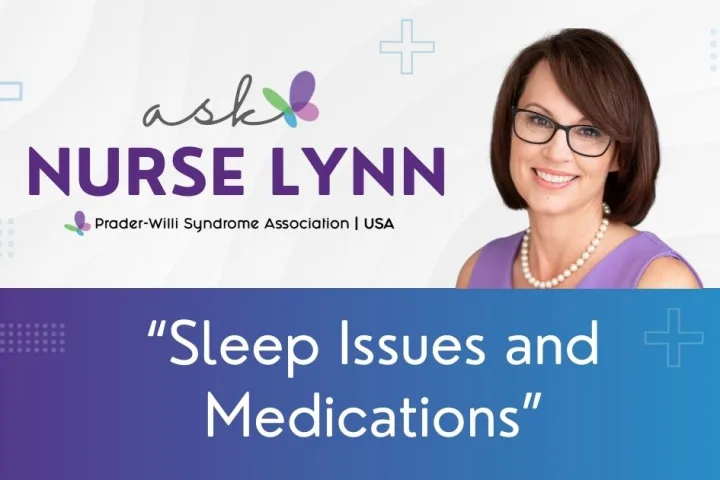Question:
Female, 66 years old, unknown subtype
My sister has been on 5mg Lorazepam 2 times a day for anxiety for ten years. Since this drug was added to her regimen her behaviors have been manageable with few periods of aggression. In the past she has been extremely out of control, even to the point of breaking both of her arms. Her psychiatrist for the past 2 years, who has never met her, who has never had a Prader Willi patient, is insisting on weening her off of lorazepam. I understand the drug is not intended for long term use, but it is working and at her age is it worth putting her through the mental torment that reducing the drug could cause? What can we, as her family, expect to occur with her behaviors? I would appreciate any advice.
Nurse Lynn’s Response:
Your concerns are valid, especially given the complexities of PWS and the long history of stability on lorazepam. Decisions about medication tapering should prioritize her overall well-being, with input from specialists familiar with PWS. Advocate for a collaborative, patient-centered approach, and ensure any changes are made cautiously and with appropriate supports in place.
What to Expect with Tapering Lorazepam
Initial Withdrawal Symptoms:
- *Increased anxiety, irritability, restlessness, insomnia, and possibly physical symptoms like tremors or gastrointestinal discomfort.
- *A potential return of aggressive or self-injurious behaviors.
Long-Term Behavioral Changes:
- *Without lorazepam, there may be a need for alternative medications or therapies to manage her anxiety and prevent aggression.
Advice for Navigating This Situation
Request a Reassessment:
- *At PWSA|USA, we offer a peer-peer consultation service where an expert in the field can consult with the prescribing doctor. If this would be something that your provider is open to, please let me know and I would be happy to arrange that.
- *Provide a detailed history of her behavioral patterns before and after starting lorazepam to emphasize its role in her care.
Explore Alternatives Carefully:
- *If tapering is unavoidable, work with the psychiatrist to develop a very gradual weaning schedule. Reductions should be made incrementally over months to minimize withdrawal effects and monitor for changes in behavior.
- *Discuss the introduction of adjunct therapies, such as behavioral support or alternative medications, before starting the taper.
Family Preparation:
- *Prepare for increased behavioral challenges during the tapering process. Having a structured plan for managing aggression or self-injurious behavior will be essential.
- *Ensure her environment is safe and supportive, with strategies in place to reduce triggers and provide reassurance.
Consider the Long-Term Plan:
- *If the medication is clearly improving her quality of life, you may need to advocate strongly for maintaining it, citing her unique needs and history.
Do you have a question for Nurse Lynn? Submit your question here:
Share this!





 Perry A. Zirkel has written more than 1,500 publications on various aspects of school law, with an emphasis on legal issues in special education. He writes a regular column for NAESP’s Principal magazine and NASP’s Communiqué newsletter, and he did so previously for Phi Delta Kappan and Teaching Exceptional Children.
Perry A. Zirkel has written more than 1,500 publications on various aspects of school law, with an emphasis on legal issues in special education. He writes a regular column for NAESP’s Principal magazine and NASP’s Communiqué newsletter, and he did so previously for Phi Delta Kappan and Teaching Exceptional Children. Jennifer Bolander has been serving as a Special Education Specialist for PWSA (USA) since October of 2015. She is a graduate of John Carroll University and lives in Ohio with her husband Brad and daughters Kate (17), and Sophia (13) who was born with PWS.
Jennifer Bolander has been serving as a Special Education Specialist for PWSA (USA) since October of 2015. She is a graduate of John Carroll University and lives in Ohio with her husband Brad and daughters Kate (17), and Sophia (13) who was born with PWS. Dr. Amy McTighe is the PWS Program Manager and Inpatient Teacher at the Center for Prader-Willi Syndrome at the Children’s Institute of Pittsburgh. She graduated from Duquesne University receiving her Bachelor’s and Master’s degree in Education with a focus on elementary education, special education, and language arts.
Dr. Amy McTighe is the PWS Program Manager and Inpatient Teacher at the Center for Prader-Willi Syndrome at the Children’s Institute of Pittsburgh. She graduated from Duquesne University receiving her Bachelor’s and Master’s degree in Education with a focus on elementary education, special education, and language arts. Evan has worked with the Prader-Willi Syndrome Association (USA) since 2007 primarily as a Crisis Intervention and Family Support Counselor. Evans works with parents and schools to foster strong collaborative relationships and appropriate educational environments for students with PWS.
Evan has worked with the Prader-Willi Syndrome Association (USA) since 2007 primarily as a Crisis Intervention and Family Support Counselor. Evans works with parents and schools to foster strong collaborative relationships and appropriate educational environments for students with PWS. Staci Zimmerman works for Prader-Willi Syndrome Association of Colorado as an Individualized Education Program (IEP) consultant. Staci collaborates with the PWS multi-disciplinary clinic at the Children’s Hospital in Denver supporting families and school districts around the United States with their child’s Individual Educational Plan.
Staci Zimmerman works for Prader-Willi Syndrome Association of Colorado as an Individualized Education Program (IEP) consultant. Staci collaborates with the PWS multi-disciplinary clinic at the Children’s Hospital in Denver supporting families and school districts around the United States with their child’s Individual Educational Plan. Founded in 2001, SDLC is a non-profit legal services organization dedicated to protecting and advancing the legal rights of people with disabilities throughout the South. It partners with the Southern Poverty Law Center, Protection and Advocacy (P&A) programs, Legal Services Corporations (LSC) and disability organizations on major, systemic disability rights issues involving the Individuals with Disabilities Education Act (IDEA), Americans with Disabilities Act (ADA), and the federal Medicaid Act. Recently in November 2014, Jim retired.
Founded in 2001, SDLC is a non-profit legal services organization dedicated to protecting and advancing the legal rights of people with disabilities throughout the South. It partners with the Southern Poverty Law Center, Protection and Advocacy (P&A) programs, Legal Services Corporations (LSC) and disability organizations on major, systemic disability rights issues involving the Individuals with Disabilities Education Act (IDEA), Americans with Disabilities Act (ADA), and the federal Medicaid Act. Recently in November 2014, Jim retired.